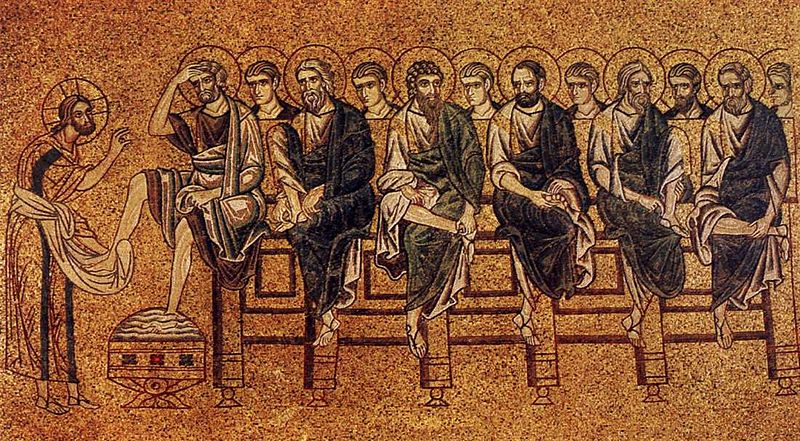
Nestled in-between Holy Wednesday and Good Friday of Holy Week is Maundy Thursday, the day our Lord instituted the Lord’s supper during the Passover meal with his disciples. Maundy Thursday’s name is derived from the Latin phrase mandatum novum (“a new commandment”) found in the Vulgate’s translation of the words of Jesus: “A new commandment I give to you, that you love one another, even as I have loved you, that you also love one another” (Jn. 13:34-35).
Most notably, it was on this day, with his crucifixion imminent, that Jesus shared this subversive command with his disciples as he knelt to wash their feet.
Throughout Jesus’ ministry, he sought more to redirect his followers’ attention to the values and ethics of the kingdom that was inaugurated in his first advent—which at times served to disrupt the status quo of society—than to grasp at the vain and ethereal elements of power espoused in their milieu. For Jesus, it is humble service displayed in love for neighbor that serves as a symbol of power in our Lord’s kingdom.
Jesus knew what was on his horizon (Jn 13:3), yet John opens this chapter with one of the simplest yet striking lines in all of Scripture. Revealing the motivation of Jesus’ act of service, John writes, “He loved them to the end” (Jn. 13:1). This love is not an ethereal or esoteric mantra, instead it is a tangible and incarnational manifestation of the love of the Triune God. Howard Thurman once noted that “love has no awareness of merit or demerit; it has no scale…Love loves; this is its nature.”[1]
And Christ, moved by his love, gave everything, even at the very expense of himself.
Jesus, whose mere birth terrified a reigning king (Mt. 2:16) and to whose name every knee will one day bow (Phil. 2:10-11), demanded not to be served by his disciples but rather to serve them. He assumed the kneeling posture, wrapped himself with a towel, and taking a small basin of water, washed their feet (Jn. 13:4-5).
Jesus washed the feet of those who followed him throughout his ministry and witnessed his marvelous deeds. He washed the feet of the very ones whose mouths confessed their allegiance to him, saying that they would never deny nor betray him. These are the feet of those who were soon to be nowhere found upon his arrest and trial. Nevertheless, Jesus, because he loved them to the very end of himself, kneeled to wash the very feet of those who were to desert him.
John interestingly highlights that Jesus proceeded to wash the feet of that fledgling disciple, Peter, who would soon deny him multiple times and who first questioned, then refused, being served by Jesus. For Peter to deny Jesus’ service was for him to reject Jesus’ radical teaching that, “If anyone wants to be first, he shall be last of all and servant of all” (Mk. 9:35). It was unfathomable to Peter for Jesus to stoop on his knees to wash his feet. He goes on to reprimand Jesus by insisting that Jesus should never wash his feet (Jn 13:8).
Peter’s response toward Jesus’ service is like our response to the acts of grace we encounter in our lives. This act of grace that Peter quickly attempts to reject from Jesus demonstrates the severity of his need for such grace. In our everyday lives, God, who is ever active and involved in his creation, provides us with opportunities to receive grace from him through others.
One of my professors helped me see this when he said to our class, “Our ability or inability to receive grace, help, compliments and kindness from others around us may directly corollate with the way in which we receive them from God.” Using 1 John 4:20 as a template, he challenged us by saying: “How can you receive grace from God, whom you cannot see, but deny grace and help from your sister or brother, whom you do see?”
Can you imagine what went through Peter’s mind when Jesus washed his feet after first refusing him? In a beautiful picture of grace to Peter, the same hands that created and crafted the wavy Galilean sea upon which Peter’s feet once walked, now cupped water from that small basin and cleansed the very same feet (Mt. 14:28-33).
How well do you receive grace, help and kindness from God? Or, ask yourself, how well do I receive grace, help, kindness and compliments from others? This Maundy Thursday, embrace this new commandment given to us by our Lord to love one another, not merely by words but also with our actions. But also ask the Lord to give yourself the grace to be able to receive this love manifested in grace, compassion, help, compliments and kindness from others. Echo these words of Howard Thurman in your prayer, “[Lord], teach me thy grace in all the little things of life.”[2] We are only able to be recipients of this grace because our Lord knelt down through 42 generations, traveling from heaven to earth to be born in a barn in Bethlehem, to make himself known to us in Jesus Christ so that he could love you and me to the very end.
[1] Howard Thurman, A Strange Freedom: The Best of Howard Thurman on Religious Experience and Public Life, ed. Walter Earl Fluker and Catherine Tumber, (Boston: Beacon Press, 2014), 181.
[2] Howard Thurman, Meditations of the Heart (Boston, MA: Beacon Press, 1953), 169.
Samuel Hagos is a 1st year M.Div. student at Beeson and serves at New Jerusalem Missionary Baptist Church in Bessemer, AL.
